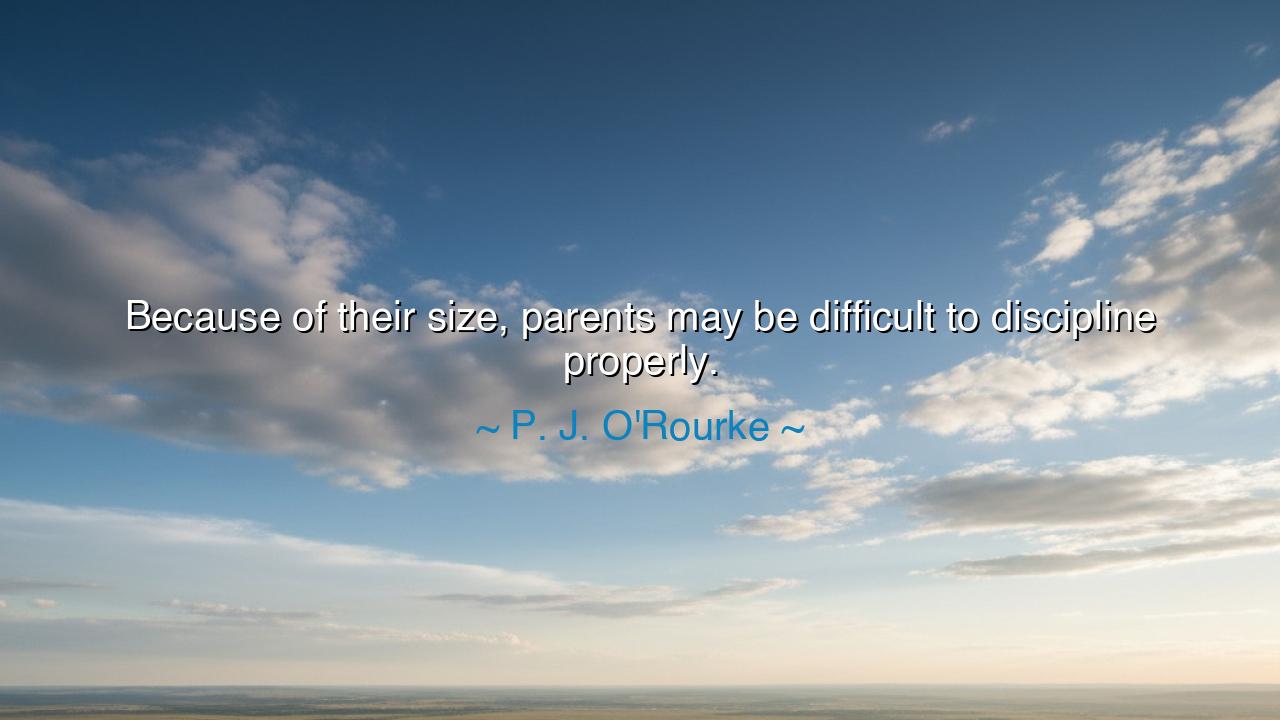
Because of their size, parents may be difficult to discipline






The words of P. J. O’Rourke—“Because of their size, parents may be difficult to discipline properly.”—are wrapped in humor, yet within the jest lies a hidden treasure of truth. The statement turns the natural order upside down: instead of parents disciplining children, it imagines children disciplining parents. The laughter it evokes comes from the absurdity, yet the wisdom emerges when we pause to reflect. For indeed, parents are not free from error, pride, or folly. They, too, stumble, and often their authority shields them from correction. O’Rourke, with wit, reminds us that even those who command respect must themselves be held accountable.
The ancients were not blind to this paradox. In the household of old, the father was often considered the ruler, the mother the keeper of the hearth. Yet the wisest of sages acknowledged that no ruler, however mighty, should stand beyond reproach. Confucius taught that harmony in the family came not from tyranny, but from mutual respect. Even kings, he said, must be guided by the honest counsel of their ministers. So too, parents—though larger, stronger, and vested with authority—must sometimes be corrected by the gentleness, honesty, or even the innocent rebuke of their children.
History offers us many examples. Consider the philosopher Xenophon, who wrote of how children sometimes reveal truths adults ignore. A child, unafraid to speak plainly, may point out hypocrisy or cruelty where others remain silent. Indeed, even in sacred texts we find the same lesson: in the story of Eli, the high priest of Israel, it was his failure to discipline his sons that led to ruin. Authority, unchecked and uncorrected, destroys both ruler and household. O’Rourke’s jest about disciplining parents, then, holds weight—without humility, even parents may become blind to their own failings.
The deeper meaning is that parenting is not a one-way road of teaching and correction. Children, in their innocence, honesty, and even their rebellion, teach their parents as well. They mirror the flaws of their elders, reflect their unspoken weaknesses, and sometimes force them to confront truths about themselves. While parents struggle to discipline their children into better habits, children, by their very being, discipline parents into patience, humility, and self-reflection. O’Rourke’s humor masks this higher truth: that the family is a circle of mutual correction, not a rigid hierarchy of power.
The image of parents being “too large” to discipline also speaks symbolically to the challenge of correcting authority figures. Just as children struggle to confront their parents, so too societies struggle to discipline their leaders. Power, whether in the home or the state, resists rebuke. Yet true wisdom is found when the mighty allow themselves to be taught by the meek. Parents who can accept correction—whether from spouse, child, or circumstance—become greater in love and authority than those who harden themselves in pride.
The lesson is clear: authority must walk hand in hand with humility. Parents must remember that they, too, are fallible, and that their children may sometimes be instruments of truth. To dismiss the voice of a child because of their smallness is folly; to hear them, even when it stings, is the mark of wisdom. Likewise, children and societies must learn to speak truth with respect, not with rebellion for rebellion’s sake, but with a desire to create harmony and justice in the home.
Therefore, let your actions be these: as parents, listen when your children reveal uncomfortable truths. Accept discipline not as humiliation, but as a chance to grow. As children, honor your parents, but do not fear to speak gently when they err. And as families, create a home where correction flows both ways—not to weaken authority, but to strengthen love and trust.
Thus, O’Rourke’s jest, though clothed in laughter, becomes a torch of wisdom: parents, too, must be disciplined—not by force of size or strength, but by humility, honesty, and love. In this mutual shaping, where parents guide children and children refine parents, the household becomes not a tyranny of power, but a fellowship of growth, preparing all within it to walk wisely in the world.






AAdministratorAdministrator
Welcome, honored guests. Please leave a comment, we will respond soon